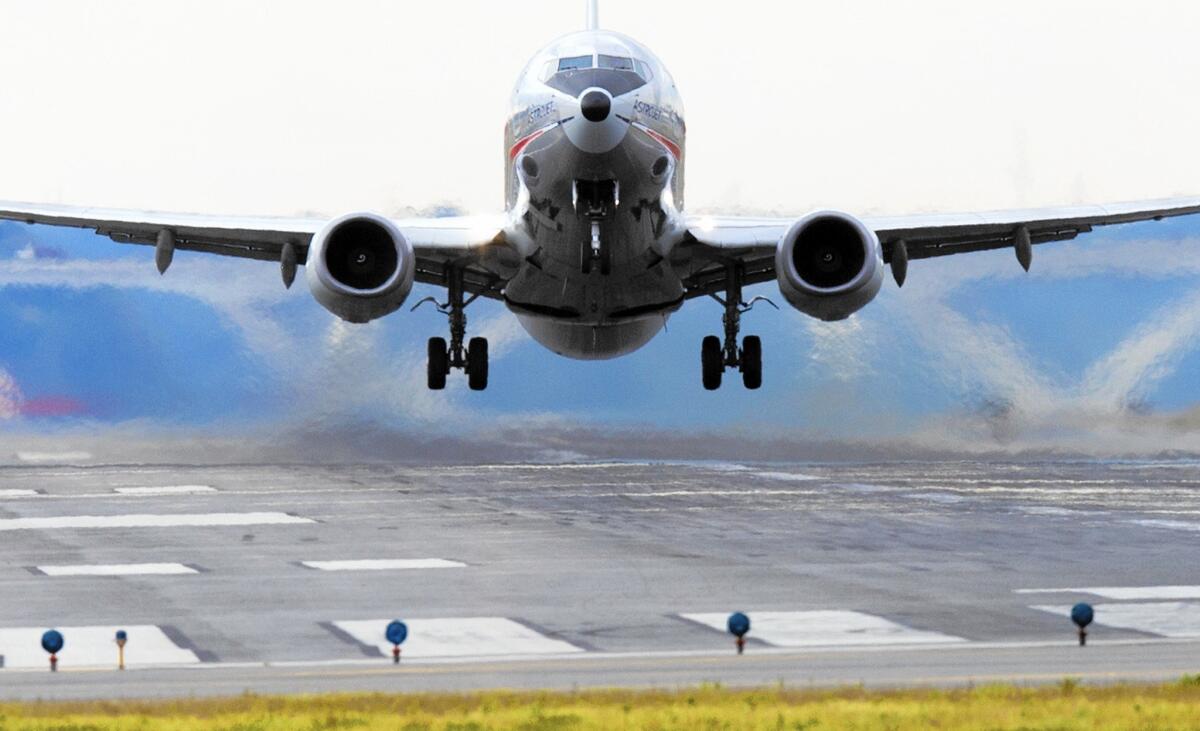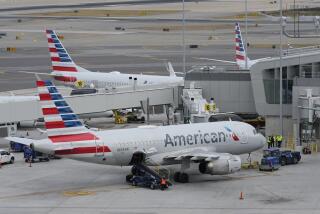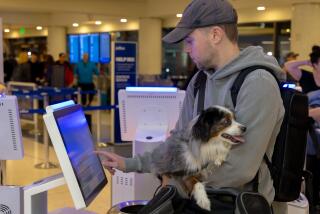Holiday airfares are rising amid record airline profits

The nation’s largest airlines are reporting record profits thanks to a stronger economy and declining fuel costs. But don’t expect the once-struggling industry to pass its good fortune on to travelers during the upcoming holidays.
Instead, airfares are climbing, with six major carriers adopting a price hike just as travelers begin to book their holiday trips.
Domestic fares around the Thanksgiving holiday are up 17% over last year, to an average of $467, according to a new study by Expedia.com, one of the world’s largest travel sites. Christmas airfares are up 2% to an average of $493, the travel site said.
Orbitz.com, another major travel site, estimated that average fares are up 3% to the top 10 destinations for U.S. travelers over the holidays.
But fares are going even higher after six of the largest carriers last week adopted fare hikes of up to $4 per round trip. The hike, which came after Expedia and Orbitz analyzed holiday fares, was initiated by JetBlue Airways and quickly matched by Delta Air Lines, Southwest Airlines, United Airlines, American Airlines and US Airways.
Airlines say airfares are still a bargain when adjusted for inflation. Plus, carriers are spending some of those profits on new planes, expanded service and “a reasonable return to investors,” said Jean Medina, a spokeswoman for Airlines for America, a trade group.
But antitrust advocates argue that the airline mergers of the last few years have cut competition so much that airlines face almost no pressure to keep prices low.
“When you have a high concentration in an industry and have a few competitors following each other, this is the outcome you will have,” said Diana Moss, vice president of the American Antitrust Institute, which fought the merger last year of American Airlines and US Airways to form the world’s largest carrier.
Fliers are also grousing, noting that the higher fares come as economy seats are getting smaller and onboard passenger fees are rising.
“Unfortunately, airlines have gotten more like the rest of corporate America and respond more to the shareholders than the public they serve,” said Kimberlyn Hearns, a frequent flier from San Bernardino.
After years of steep financial losses following the Sept. 11 terrorist attacks, the airline industry is rebounding.
JetBlue and Southwest reported record profits in 2013, and American announced record profit for the second quarter of 2014.
U.S. airlines posted a combined $3.6 billion in profits in the April-through-June period, a 64% increase over a year earlier, according to federal data.
Delta, the first of the major airlines to report third-quarter earnings, announced profit last week that exceeded Wall Street expectations, with revenue up 6.6% and traffic growing by 3.7% compared with a year earlier.
Instead of cutting fares, the Atlanta-based airline invested a big chunk of its gains toward employee profit sharing and replacing older planes with new models.
American, United and Southwest are scheduled to report their latest earnings Thursday, and industry analysts predict wide profit margins, thanks to rising ticket sales and lower fuel costs.
Jet fuel prices, which represent one of the airline industry’s largest expenses, have dropped nearly 16% in the last year, according to the U.S. Energy Information Administration.
And they could drop further. The Energy Department reported an increase in oil inventories Wednesday that was far larger than analysts expected.
Airlines have also benefited from a series of mergers in the last few years that have enabled the largest carriers to eliminate overlapping routes and cut service to low-profit, mid-size airports such as Milwaukee, New Orleans, Pittsburgh and San Antonio.
With the merger of American Airlines and US Airways last year, 80% of all domestic travel in the U.S. is now controlled by four airlines, according to a federal analysis.
“With fewer competitors, I think you are going to see more of the same,” Moss said, referring to fare hikes.
Jan Brueckner, an economics professor at UC Irvine, is not as critical of airlines.
“Airlines have been historically big money losers, so having airlines make a profit is a good thing,” Brueckner said. “It means the industry is healthy.”
But Betsy Snyder, an analyst at Standard & Poor’s, noted that airlines raised fares during the recession, blaming surging fuel costs.
“So, why don’t they lower fares when fuel prices go down?” she asked. “Because it doesn’t work that way. I think they will take advantage of this and try to raise fares as much as possible.”







